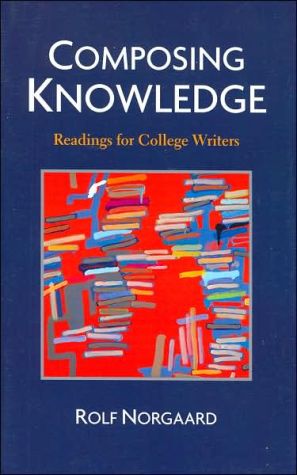

 |

|

Sold Out
Book Categories |
Alternate Contents
Preface for Instructors
Preface for Students
Introduction
Knowing and Composing
Reading the Conversation
Deborah Tannen, "Agonism in the Academy: Surviving Higher Education's Argument Culture" [annotated essay]
Joining the Conversation
Into the Field
1. Joining the Conversation
Learning the Language
Jonathan Kozo, "The Human Cost of an Illiterate Society"
Perri Klass, "Learning the Language"
David Berreby, "It Takes a Tribe"
Amy Tan, "The Language of Discretion"
Theodore R. Sizer, "Public Literacy: Puzzlements of a High School Watcher"
Barbara Mellix, "From Outside, In"
Dancing with Professors
Mike Rose, "Entering the Conversation"
Gerald Graff, "Disliking Books at an Early Age"
Patricia Limerick, "Dancing with Professors: The Trouble with Academic Prose"
Nancy Sommers, "Between the Drafts"
2. Inventing the University
Constructing Classrooms
Sharon Rubin, "Professors, Students, and the Syllabus"
Alexander Calandra, "Angels on a Pin: The Barometer Story"
Gerald Graff, "Other Voices, Other Rooms"
bell hooks, "New Words, New Worlds"
Charles Bazerman, "Where is the Classroom?"
Writing the University
C. H. Knoblauch, "Literacy and the Politics of Education"
David Bartholomae, "Inventing the University"
Joseph Williams and Gregory Colomb, "Two Metaphors for Learning" and "The Novice Writer"
Katha Pollitt, "Why We Read"
Paolo Freire, "The 'Banking' Concept of Education"
Louis Menand, "What Are Universities For?"
3. Persuading Each Other
Frames of Reference
Theodore Roszak, "Of Ideas and Data"
Christopher Lasch, "The Lost Art of Political Argument"
George Orwell, "What is Science?"
Roger C. Schank, "Story Skeletons and Story-Fitting"
George Lakoff and Mark Johnson, "Metaphors We Live By"
Jeanne Fahnestock, "Accommodating Science: The Rhetorical Life of Scientific Fact"
Arguing in Communities
David R. Russell, "Community or Communities?"
Wayne Booth, "The Idea of a University--As Seen by a Rhetorician"
Horace Miner, "Body Ritual among the Nacirema"
Robin Lakoff, "In the Grooves of Academe"
Jared Diamond, "Soft Sciences are often Harder than Hard Sciences"
James Boyd White, "The Invisible Discourse of the Law"
4. Engagements
Collaborations
Michael Parker, "Talking Back to Books: In Defense of Marginalia"
Lisa Ede and Andrea Lundsford, "Why Write ... Together?"
Kenneth Bruffee, "Making the Most of Knowledgeable Peers"
Malcolm Gladwell, "The Talent Myth: Are Smart People Overrated?"
Thomas Kuhn, "The Essential Tension: Tradition and Innovation in Scientific Research"
Border Crossings
Nancy Sakamoto, "Conversational Ballgames"
Jane Tompkins, "A Visit to the Museum"
Mary Louise Pratt, "Arts of the Contact Zone"
David Thelen, "Becoming Martin Luther King Jr."
5. (En)gendering Knowledge
Speaking of Gender
Deborah Tannen, "How Male and Female Students Use Language Differently"
Beverly Gross, "Bitch"
Hermione Lee, "Power: Women and the Word"
Barbara Smith, "Homophobia: Why Bring It Up?"
Minding Gender
Jamaica Kincaid, "Girl"
Scott Russell Sanders, "The Men We Carry in our Minds"
Stephen Jay Gould, "Women's Brains"
Emily Martin, "The Egg and the Sperm: How Science Has Constructed a Romance Based on Stereotypical Male-Female Roles"
6. Learning Technology
Virtual Communities
Nancy Hass, "In Your Facebook.com"
Scott London, "Civic Networks: Building Community on the Net"
Neil Postman, "Virtual Student, Digital Classrooms"
Laura Gurak, "Cyberliteracy: Toward a New Internet Consciousness"
Susan Herring, "Bringing Familiar Baggage to the New Frontier: Gender Differences in Computer-Mediated Communication"
Dorothy Winsor, "The Construction of Knowledge in Organizations: Asking the Right Questions about the Challenger"
Minding the Machines
Alan C. Kay, "Computers, Networks, and Education"
Sven Birkerts, "Perseus Unbound"
Ian Parker, "Absolute PowerPoint: Can a Software Package Edit our Thoughts?"
Jay David Bolter, "Writing Culture"
7. Seeing and Believing
Mind's Eye
Annie Dillard, "Seeing"
John Berger, "The White Bird"
Susan Sontag, "In Plato's Cave"
Georgina Kleege, "The Mind's Eye"
E. H. Gombrich, "Truth and Stereotype"
Witnessing the Image
David Levi Strauss, "Photography and Belief"
Scott McCloud, "Show and Tell"
John Durham Peters, "Witnessing"
H. Bruce Franklin, "From Realism to Virtual Reality: Images of America's Wars"
Francis A. Beer and G. R. Boynton, "Globalizing Terror"
Login|Complaints|Blog|Games|Digital Media|Souls|Obituary|Contact Us|FAQ
CAN'T FIND WHAT YOU'RE LOOKING FOR? CLICK HERE!!! X
 You must be logged in to add to WishlistX
 This item is in your Wish ListX
 This item is in your CollectionComposing Knowledge: Readings for College Writers
X
 This Item is in Your InventoryComposing Knowledge: Readings for College Writers
X
 You must be logged in to review the productsX
 X
 X

Add Composing Knowledge: Readings for College Writers, Higher education has its own rules — rules about who is heard, what counts as knowledge, what works as persuasion. They are conventions that must be learned — and taught. So it is no wonder that for new students, college can be a confusing place. Compo, Composing Knowledge: Readings for College Writers to the inventory that you are selling on WonderClubX
 X

Add Composing Knowledge: Readings for College Writers, Higher education has its own rules — rules about who is heard, what counts as knowledge, what works as persuasion. They are conventions that must be learned — and taught. So it is no wonder that for new students, college can be a confusing place. Compo, Composing Knowledge: Readings for College Writers to your collection on WonderClub |